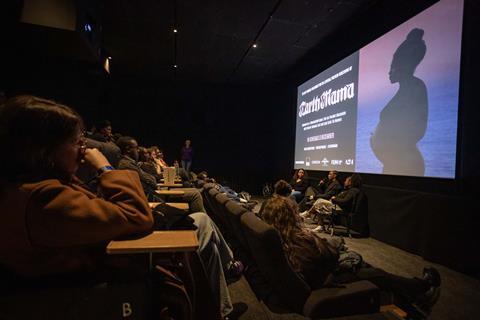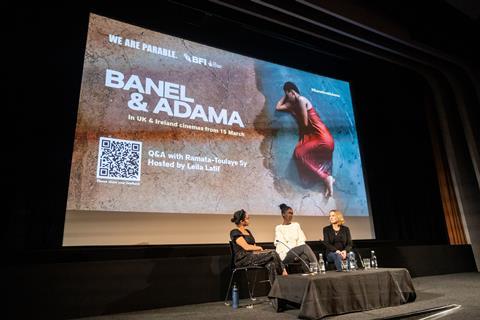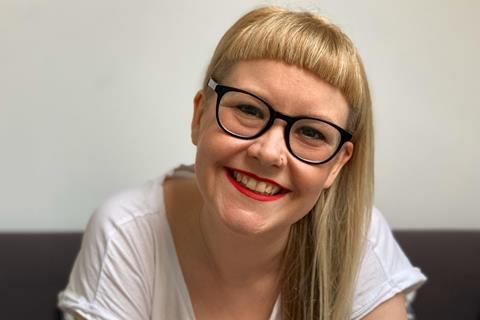While distributors and exhibitors can arrange their own events for films, an increasing number of specialised UK organisations — including We Are Parable, Reclaim The Frame and TAPE Collective — are helping to develop audiences.

‘Eventising’ is the word du jour within exhibition. The catch-all term denotes ways to motivate audiences so they engage with cinemas by offering more than a straightforward screening of a film. The strategy is becoming ever more popular as distributors and exhibitors attempt to rally the lapsed post-pandemic, streaming-initiated viewers.
The approach is nothing new. For many years, a range of UK organisations and programming collectives have worked from the grassroots up, curating events to connect films with specific, and often undervalued, audiences. Early champions in the space include Black Film Bulletin, with co-founder June Givanni receiving an honorary award at this year’s Bafta Film Awards, plus the Bechdel Test Fest, Kush Films and The New Black Film Collective. Today, the likes of We Are Parable, TAPE Collective, Reclaim The Frame, Bounce Cinema, MilkTea, Minute Shorts and Massive Cinema have joined the fray.
“There are more options and routes for these organisations [now] to both access funding and also be seen in the mainstream,” says Ben Luxford, director of audiences at the British Film Institute (BFI). “They’re not working on the fringes anymore — they’re fundamental, whether that’s for awards campaigning or a key part of audience development.”
Events around releases include screenings in advance of release or on opening weekend, Q&As with a director, talent or an expert relevant to a film’s subject matter, experimental activities such as spoken-word and musical performances — and, at a TAPE event for Babak Jalali’s Fremont, writing sessions for fortune cookie messages.

“Our goal since we started in 2013 has been engaging audiences who we think the film might be targeted to, and them having the opportunity to see it in a space with people who might feel like-minded with them,” says Anthony Andrews, co-founder of We Are Parable with his wife Teanne Andrews, an organisation that seeks to celebrate Black cinema from around the world. “It’s an overly used term, but a ‘safe space’.”
We Are Parable has worked across US studio and streamer releases such as Black Panther and Glass Onion: A Knives Out Mystery, and on arthouse titles including Alice Diop’s Saint Omer. Its biggest activation to date has been a three-day event at London community space Pop Brixton in partnership with Paramount Pictures, which featured music, spoken-word and screenings ahead of the release of Bob Marley: One Love.
“An emotional connection forms with the audience, and when that is formed, there’s the opportunity for that film to amplify among the audience’s network and tell people about the experience they’ve had,” notes Andrews, with Bob Marley: One Love totalling £16.5m ($21m) in the UK and Ireland at time of publication. Andrews believes it is this emotional connection that has helped We Are Parable build an “organic” following, which puts its faith in the organisation’s curatorial taste.
TAPE Collective was founded in 2015 by Isra Al Kassi and Angela Moneke, and curates screenings with a focus on representation, identity and heritage. TAPE initially screened films with no licence fee in alternative spaces, but has evolved to work with independent distributors and cinemas. Mubi is a regular partner, collaborating on the likes of Lingui: The Sacred Bonds. For this title, TAPE reached out to the Home Girls Unite organisation — which works with eldest daughters in immigrant households — to build conversation around the film.

“People understand outreach as a newsletter or a tweet. That’s not outreach,” says Al Kassi. “It’s years of building up relationships and trust, and not BCC-ing people into an email saying, ‘Can you share this?’” Instead, she explains, “It is mainly through community leaders and organisations. That’s where the conversations are really important — they know what works and what doesn’t work [for their communities].”
Reclaim The Frame grew out of a film festival, and is now working as a campaign group for people of marginalised genders in all film spaces. Eight impact producers work across 16 cities to reach audiences outside of Reclaim The Frame’s typical orbit for special screenings of films such as How To Have Sex and Smoke Sauna Sisterhood.
While We Are Parable, TAPE and Reclaim The Frame hold events in cities across the UK, some groups are more regionally focused — Maona Art is an African cinema organisation based in Oxford and Leeds, and Sheba Soul Ensemble is a collective engaging with marginalised communities in Bristol and the surrounding areas.
In 2017, the BFI’s audience funding underwent a strategy change, refocusing its support from being industry-focused to public audience-focused. “We looked at all the data that had existed from Lottery funding from the UK Film Council [2000-11] through to when I joined [in 2015], and realised it was the same people and the same audiences who were benefiting from Lottery interventions,” says Luxford. “All of this was playing out against a significant and needed conversation about who has permission, and who doesn’t, to be a gatekeeper, to show things and make things, and distribute, and acquire, and know who the audience is.”
BFI National Lottery funding to which the organisations can apply sit within the BFI Audience Projects Fund (£15m/$19m across 2023-26) and the Film Audience Network (£9.9m/$12.6m, 2023-26). BFI funding for the events is crucial. “We wouldn’t do anything without that,” says Al Kassi.
Organisations both pitch for films and are approached directly by distributors. TAPE and Reclaim The Frame charge a fee to distributors for hosting events, with the box office then recouped by distributors and exhibitors in their typical split. “The fees we get from distributors aren’t back to what they were at pre-Covid levels,” says Reclaim The Frame director Melanie Iredale. “It’s a struggle, particularly for the smaller, more independent distributors.” Andrews notes We Are Parable’s funding model for events is “fluid with different clients”, while declining to reveal specifics.
At TAPE, Al Kassi works full-time while Moneke balances it alongside her day job as senior production executive at Working Title. TAPE’s hustles include workshops, guest festival curation and an online streaming platform, with the events side of the business accounting for less than half of its income.
We Are Parable also maintains other ventures, such as working with UK broadcaster Channel 4 on Momentum, a professional development programme for Black creatives. Both We Are Parable and TAPE have branched out into film distribution in the UK. We Are Parable released Bafta winner Earth Mama in partnership with Universal Pictures Content Group and is distributing Cannes 2023 title Banel & Adama, while TAPE’s slate includes Cette Maison and Shabu. For Reclaim The Frame, which is set up as a charity, a move into film distribution is not on the cards.
Box-office impact

For some modestly budgeted independent titles, events around a film’s Q&A run can be a core part of the overall box-office takings. Jeanie Finlay’s documentary Your Fat Friend embarked on a successful Q&A previews tour with its US star Aubrey Gordon and director Finlay, grossing £45,300 ($58,000) for Glimmer Films and Tull Stories. Further audience engagement activities surrounding the film’s release included partnerships with independent book shops and making sure seat size was a focus of the preview tour, with venues asked to publish seat sizing on their websites, along with other accessibility information.
Box office has been flowing less freely since the tour ended, and the film grossed £60,100 ($76,800) after six weeks of official release, including previews.
For new distributor We Are Parable, Earth Mama grossed £12,100 ($15,400) across its run in UK and Ireland cinemas, and Banel & Adama opened with £11,300 ($14,300) from 26 venues, including previews, and had reached £17,400 ($22,000) after 10 days.

Iredale and Al Kassi agree it takes time to build the awareness that independent titles need to flourish at the box office. “The fact we decide a film’s continuation on the Monday after it’s opened is really stressful,” says Al Kassi. Iredale adds: “I feel so many of the films we work on — because they tend to be smaller, more independent, more marginalised-led — would benefit from a more forgiving model.”
We Are Parable, TAPE and Reclaim The Frame all agree that measuring the impact of eventising in box-office results does not paint a full picture — engaging alienated audiences through cinema is at the core of their missions.
According to a Reclaim The Frame audience survey conducted across 2023, it is the first time ever visiting the host cinema for 31% of attendees; 93% of respondents said they usually feel excluded at cultural events, but feel included at a Reclaim event.
We Are Parable’s Andrews recalls feedback he received when putting on a Black Panther screening at the BFI Southbank. “When we were promoting that event, people would ring us up saying, ‘It’s at the BFI Southbank, do I have to wear a suit and tie?’” he says. “People didn’t understand it was a space 100% for them. It’s a space they own. They’re taxpayers.”
Al Kassi witnessed a similar reaction to a Shabu screening hosted by TAPE at the BFI Southbank. “The number of people who said, ‘I didn’t know about this place,’ was funny. Funny, or scary.”


































No comments yet